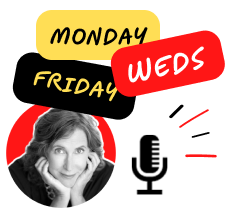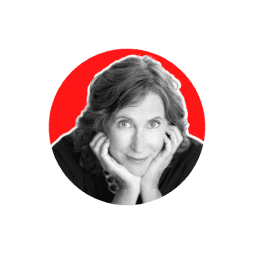Maybe it’s a good idea to tell people who you are, before we start.
I’m Sandra, I’m born in Scotland and I grew up kind of all over the world and have ended up in Copenhagen, Denmark. I am an engineer and a scientist, and I look after innovation and technology development for a biotech company. I worked for a Canadian company that spun out an advanced materials division. I have background in materials and I’ve worked on a lot of sensors for telecommunications, space, and healthcare. I got a bit bored with just doing sensors, so I wanted to increase the complexity and I added biology and boy, is it complex.
We were talking about that and we got on the subject of creativity. You said something that struck me. I said, oh, you’ve been doing some interesting things – you’ve been painting and knitting – and you said something like, yeah, it, going back to my creative practices has basically had a huge return on investment in your work.
Oh yeah. That’s definitely true. I mean science and engineering are essentially creative careers. But it’s not the perception and it’s not how people do it. Of course, science is a method, right? So you use the method, but the method in and of itself is just the bones and. So there is a lot of space for bringing in a lot of different ideas, but people get locked in. I did my PhD in Germany and that was very much like … people there are very narrow, very focused, very constrained in what they do for their PhD because it’s kind of like a job, right? When I came at it, they thought I was incredibly chaotic because I love going between disciplines and pulling from all the different disciplines. I have, you know, what started as a kind of fairly small PhD that ended up involving like seven institutes and I pulled in a Nobel Prize winner as an advisor, and so it got really nuts and very hairy.
Nobody was doing that at the time, and I was like, no, no, I love this. Why would I need to develop expertise in a tiny little corner when I can pull from someone else’s expertise over here, over there? And then, and so I just mix and matched and I had incredible results, and that’s why I was headhunted to Denmark. It kind of blew some people’s minds. Also, that I started my PhD in Germany over the age of 30 was just shocking for a lot of Germans. But I was ripe for it. I wasn’t ready before, so I think I learned a lot about resilience and also following my own path and not really listening to what other people say.
And when you’re in your creativity, whatever that looks like, it’s like I’m following my own tune. I’m building resilience and also I’m keeping it open. You know, creativity is not something you can directly control. So when I’m painting, I would love my painting to look like a picture, but it doesn’t look like a picture. It’s my interpretation of something. And that can be frustrating. I don’t sit down in my painting class in Copenhagen and do excellent work. Sometimes I’m just fried, and I actually make things worse and then I’m frustrated and I’m, you know, but the way, how does that, for example, let’s just talk about painting because that’s what we were just talking about.
How do you think that informs your performance or your creativity at work ? So painting’s kind of clever in that, it does require a lot of focus but at the same time you also have to let go. So you have to focus and defocus, and things don’t always go the way you think they will. So, allowing for that frustration and backing off and then re-looking at it the next day, that is a practice for what you try to do in creative work as a scientist, because experiments don’t work and you can’t figure it out and so it’s like I’m testing a muscle of focus and then defocus in the art thing, and it has this kind of metaphysical, energetic shifting between the left brain and the right brain, pulling in things that you don’t necessarily think are directly related. They just come in, so, it kind of opens different channels
I think to pull together ideas your ability to articulate what you just did is just beautiful. So are these realizations that you’re having in hindsight, meaning now that you’ve come back and rediscovered and spent the time on your creative process, or is this something you’ve always known?
It’s something that – well, if I don’t do it, there’s a hole. There’s a cost to it. And I don’t think I’ve fully appreciated the cost of not doing it before.

















